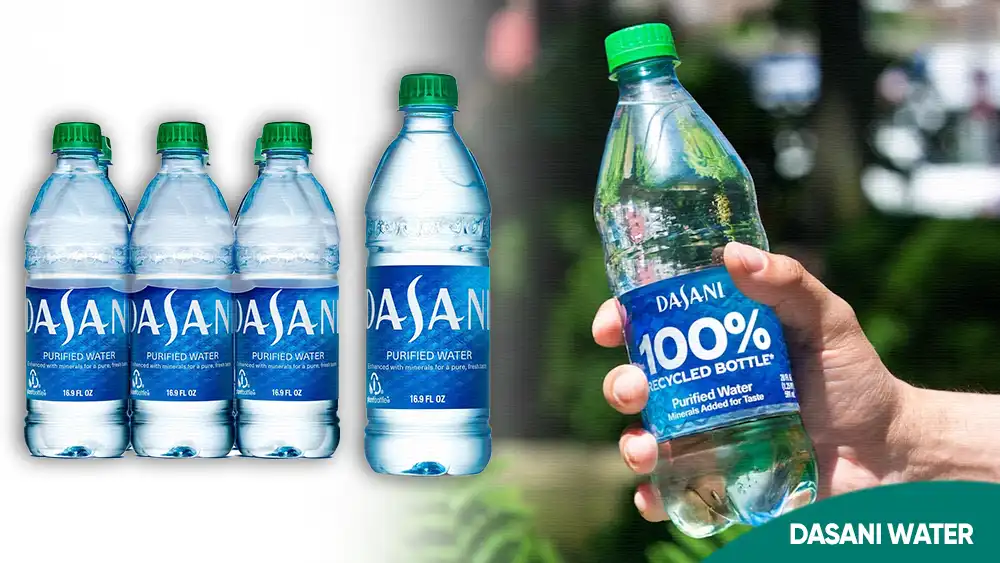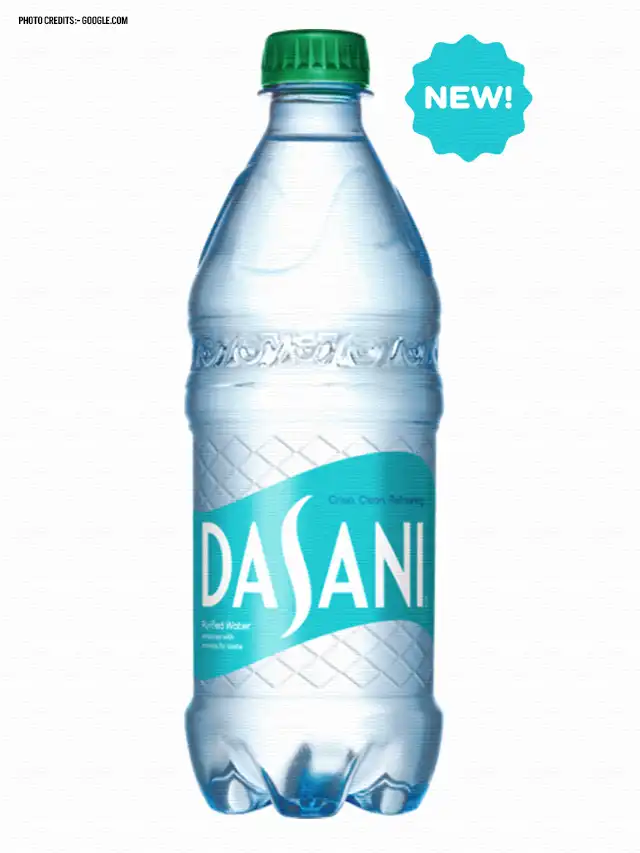
HEALTH BLOG
Is Dasani Water Bad? A Complete Analysis in 2024
-
Rahul Priydarss
Wondering, “Is Dasani Water Bad?” Discover the truth about Dasani Water’s safety, taste, and environmental impact. This popular bottled water, owned by The Coca-Cola Company, undergoes reverse osmosis purification and has a distinct mineral blend for enhanced flavor. Explore common concerns, including sodium content, source purification, and plastic waste. Learn how Dasani compares to other bottled water brands and whether its environmental efforts are enough to address plastic pollution. Find out if Dasani Water meets health standards and whether it’s the right choice for you. Get the facts on Dasani Water and make an informed decision about your hydration.
Introduction of Dasani Water:
Dasani Water, a popular brand owned by The Coca-Cola Company, has been a refreshing choice for consumers since its introduction in 1999. Known for its clean and crisp taste, Dasani is crafted using a purification process that includes reverse osmosis and a blend of minerals to enhance flavor. The brand’s commitment to quality and sustainability has made it a preferred option for many seeking reliable hydration. With its sleek, eco-friendly packaging and consistent taste, Dasani has become a trusted name in the bottled water industry, offering convenience and refreshments to people around the world.
What is Dasani Water:
Dasani Water is a brand of bottled water produced and distributed by The Coca-Cola Company. It is known for its clean, crisp taste and is made using a process that involves reverse osmosis to purify the water. After purification, a carefully selected blend of minerals, including magnesium sulfate, potassium chloride, and salt, is added to enhance the taste. The water is then bottled in eco-friendly packaging, often using PlantBottle® technology, which incorporates up to 30% plant-based materials. Dasani Water is marketed as a refreshing and reliable choice for hydration, available in various sizes to suit different consumer needs.

Table of Contents
What is Coca-Cola:
Coca-Cola, often referred to simply as Coke, is a globally recognized brand and one of the most popular carbonated soft drinks worldwide. Introduced in 1886 by pharmacist John Stith Pemberton in Atlanta, Georgia, Coca-Cola was initially marketed as a medicinal tonic. Its unique and refreshing taste quickly gained popularity, leading to its widespread consumption. Over the years, Coca-Cola has evolved from a local beverage to an international symbol of refreshment, representing not just a drink but a cultural icon.
The Coca-Cola brand is renowned for its distinctive flavor, characterized by a sweet profile with hints of vanilla, cinnamon, and a subtle citrus zest. The primary ingredients in Coca-Cola include carbonated water, high fructose corn syrup or sugar, caramel color, phosphoric acid, natural flavors, and caffeine. This signature blend has remained largely unchanged, contributing to its consistent taste that consumers worldwide have come to love.
Origin and History of Dasani Water:
Dasani Water was launched in 1999 by The Coca-Cola Company, one of the world’s leading beverage manufacturers. The brand was introduced as part of Coca-Cola’s strategy to enter the bottled water market, which was rapidly growing in popularity at the time. Dasani was designed to offer a purified and consistently flavored water option, differentiating itself from other brands by using a purification process that includes reverse osmosis.
The brand’s name, “Dasani,” was chosen to evoke a sense of purity and refreshment. The water is sourced from local municipal supplies, then purified and enhanced with a blend of minerals to achieve its distinct taste. This approach allows Dasani to maintain a consistent flavor profile across different regions.
Despite its initial success, Dasani faced challenges in certain markets. For instance, in 2004, the brand was withdrawn from the UK market due to controversy over its source and the addition of minerals. However, Dasani continued to grow in other markets, becoming one of the top bottled water brands in North America.
Over the years, Dasani has expanded its product line to include various options such as flavored water and sparkling water. The brand has also emphasized sustainability, introducing PlantBottle® packaging, made partially from plant-based materials, to reduce its environmental impact.
Today, Dasani remains a popular choice for consumers seeking convenient and refreshing bottled water, known for its commitment to quality and sustainability.
Is Dasani Water Bad?:
The question of whether Dasani Water is “bad” can be subjective and depends on individual preferences and perspectives. However, here are some common points of discussion that might help clarify concerns:
Purification Process and Added Minerals: Dasani Water is purified using a process called reverse osmosis, which removes impurities from the water. After purification, minerals such as magnesium sulfate, potassium chloride, and a small amount of salt are added to enhance the flavor. These added minerals are generally considered safe and are used to give Dasani its distinctive taste.
Controversies and Criticisms:
- Source and Purification: Some people criticize Dasani for being sourced from municipal water supplies, essentially making it “purified tap water.” However, this is a common practice among many bottled water brands.
- Added Salt: The addition of salt, even in small amounts, has raised concerns for some consumers, especially those on low-sodium diets. However, the levels are minimal and typically not a significant source of dietary sodium.
- Environmental Impact: Like many bottled water brands, Dasani faces criticism for its environmental impact, particularly concerning plastic waste. Coca-Cola has addressed this by introducing PlantBottle® packaging, which incorporates plant-based materials.
Health and Safety: From a health perspective, Dasani Water is generally considered safe to drink. The purification process ensures that the water meets safety standards, and the added minerals are commonly found in many other foods and beverages. There are no widespread reports of health issues directly associated with drinking Dasani.
Ingredients of Dasani Water:
Dasani Water is known for its clean taste, achieved through a combination of purification and added minerals. The primary ingredients are.
Purified Water: The base of Dasani is purified water, obtained from local municipal water supplies.
Magnesium Sulfate: This mineral is added for flavor and is commonly found in various foods and supplements.
Potassium Chloride: Also added for flavor, potassium chloride is a salt substitute often used in food products.
Salt: A small amount of salt is included to enhance the taste, although the quantity is minimal and not significant as a source of dietary sodium.
Production Process of Dasani Water:
The production process for Dasani Water involves several key steps.
Sourcing: The water used for Dasani is sourced from local municipal water systems. This is a common practice among many bottled water brands, ensuring a readily available and consistent water supply.
Purification: The water undergoes a thorough purification process, primarily using reverse osmosis. This method effectively removes impurities, such as dissolved salts, minerals, and other contaminants. The reverse osmosis process involves pushing water through a semi-permeable membrane, leaving behind impurities.
Mineral Addition: After purification, a precise blend of minerals is added to the water. These minerals include magnesium sulfate, potassium chloride, and salt. The purpose of adding these minerals is to give Dasani its distinctive taste and to provide a consistent flavor profile across all bottles.
Bottling: Once the water has been purified and the minerals added, it is bottled in Dasani’s signature eco-friendly packaging. The brand has made efforts to reduce its environmental impact by using PlantBottle® technology, which incorporates up to 30% plant-based materials in plastic bottles. The bottles are sealed to ensure the water remains pure and free from contaminants.
Quality Control: Throughout the production process, rigorous quality control measures are in place to ensure the safety and consistency of the product. This includes regular testing for contaminants and monitoring the mineral content.
Dasani Water and Sodium Levels:
Dasani Water contains a small amount of sodium, which is added as part of the mineral blend to enhance the flavor. The specific ingredient contributing to sodium content is salt (sodium chloride). While the sodium levels in Dasani are minimal, they are worth noting for individuals who are particularly sensitive to sodium intake or are on a low-sodium diet.
Sodium Content: The exact amount of sodium in Dasani Water is typically quite low. For instance, a standard 500 ml bottle of Dasani contains approximately 5 mg of sodium. This is considered a negligible amount in the context of daily sodium intake, as the American Heart Association recommends consuming no more than 2,300 mg of sodium per day, with an ideal limit of 1,500 mg for most adults.
Health Considerations:
- General Population: For most people, the small amount of sodium in Dasani Water is not a cause for concern. The sodium levels are far below any threshold that would impact overall sodium intake significantly.
- Individuals on Low-Sodium Diets: For those on strict low-sodium diets, such as individuals with hypertension or other cardiovascular conditions, even small amounts of sodium can add up. However, the sodium content in Dasani is so minimal that it is unlikely to have a significant impact on overall dietary sodium intake.
- Taste: The inclusion of a small amount of salt can slightly alter the taste, giving Dasani a unique flavor profile that some consumers prefer. The addition is designed to enhance the overall drinking experience rather than contribute to dietary sodium intake.
Health Concerns with Dasani Water:
While Dasani Water is generally considered safe and a reliable source of hydration, there are a few health concerns and criticisms that some people might consider.
1. Sodium Content: Dasani Water contains a small amount of sodium, added as part of the mineral blend to enhance flavor. Although the sodium content is minimal (about 5 mg per 500 ml bottle), individuals on strict low-sodium diets may want to be mindful of their overall sodium intake, even from sources like bottled water.
2. Source and Purification: Dasani uses water sourced from local municipal supplies, which is then purified through reverse osmosis. Some critics argue that this process essentially turns tap water into bottled water, leading to questions about the value proposition. However, the purification process removes impurities and ensures consistent quality.
3. Plastic Bottles and Environmental Impact: Dasani has faced criticism for its use of plastic bottles, which contribute to environmental pollution. Although Coca-Cola has made efforts to reduce this impact by using PlantBottle® packaging, which includes up to 30% plant-based materials, plastic waste remains a significant concern. Environmentally conscious consumers may prefer alternatives like reusable water bottles or brands with more eco-friendly packaging.
4. Potential Contaminants: While Dasani undergoes a rigorous purification process, no system is entirely foolproof. There is always a minimal risk of contaminants, though this is generally rare. Regulatory bodies like the FDA in the United States set standards to ensure bottled water’s safety, and companies must comply with these regulations.
5. Lack of Natural Minerals: Some people prefer natural spring water that retains its original mineral content, which can offer additional health benefits. In contrast, Dasani adds minerals after purification, which may not provide the same natural balance.
6. Public Perception and Controversies: Dasani has faced public scrutiny and controversies in some regions. For example, it was withdrawn from the UK market in 2004 due to a controversy over its source and the addition of bromate, a byproduct of the ozonation process. While the issue was resolved, it left a lasting impression on some consumers.

Dasani Water vs. Other Bottled Water Brands:
When comparing Dasani to other bottled water brands, several factors come into play, including source, purification process, mineral content, taste, packaging, and environmental impact. Here’s a breakdown of how Dasani stacks up against other popular brands.
1. Source and Purification:
- Dasani: Sourced from local municipal water supplies and purified using reverse osmosis. Minerals such as magnesium sulfate, potassium chloride, and salt are added for taste.
- Aquafina: Similar to Dasani, Aquafina is also sourced from municipal water supplies and purified using a process called HydRO-7, which includes reverse osmosis.
- Evian: Natural spring water sourced from the French Alps. It is naturally filtered through glacial rocks, retaining natural minerals.
- Fiji Water: Artesian water sourced from an aquifer in the Fiji Islands. It is naturally filtered through volcanic rock, resulting in high silica content.
- Poland Spring: Sourced from natural springs in Maine, USA. The water is naturally filtered and retains its mineral content.
2. Mineral Content and Taste:
- Dasani: Known for its clean, crisp taste, achieved through the addition of minerals. The taste is designed to be consistent and refreshing.
- Aquafina: Purified and almost entirely devoid of minerals, giving it a neutral taste. It is often described as having a very clean and light taste.
- Evian: Naturally high in minerals, including calcium and magnesium, giving it a unique, slightly mineralized taste.
- Fiji Water: Contains natural minerals like silica, which contribute to its smooth, slightly sweet taste.
- Poland Spring: Contains naturally occurring minerals, resulting in a clean and slightly mineral taste.
3. Packaging and Environmental Impact:
- Dasani: Uses PlantBottle® technology, incorporating up to 30% plant-based materials. The brand has faced criticism for plastic waste but has made efforts to improve sustainability.
- Aquafina: Similar plastic bottle concerns, with some efforts towards using recycled materials.
- Evian: Focuses on eco-friendly packaging and sustainability initiatives, including a commitment to using 100% recycled plastic by 2025.
- Fiji Water: Uses square bottles, which are claimed to be more space-efficient for shipping. The company has also committed to reducing its carbon footprint.
- Poland Spring: Offers bottles made from 100% recycled plastic for some of its products and is working towards more sustainable packaging.
4. Price and Availability:
- Dasani: Generally affordable and widely available, often found in convenience stores, supermarkets, and vending machines.
- Aquafina: Also widely available and similarly priced to Dasani.
- Evian: Often considered a premium brand, Evian tends to be more expensive due to its natural spring source and mineral content.
- Fiji Water: Positioned as a luxury brand, Fiji Water is more expensive than most other bottled waters, reflecting its unique source and mineral profile.
- Poland Spring: Priced competitively, with a wide range of availability, particularly in the United States.
Environmental Impact of Dasani Water:
Dasani Water, like many bottled water brands, has faced scrutiny regarding its environmental impact. Key areas of concern include plastic waste, resource use, and sustainability efforts. Here’s a detailed look at the environmental impact of Dasani Water.
1. Plastic Bottles and Waste:
Plastic Usage: Dasani Water is primarily sold in plastic bottles, which contributes to the overall issue of plastic waste. Plastic bottles can take hundreds of years to decompose, leading to significant environmental challenges.
Recycling: Dasani has introduced PlantBottle® technology, which incorporates up to 30% plant-based materials in the plastic bottle. This aims to reduce reliance on fossil fuels and lessen the carbon footprint of the bottles. However, the majority of the bottle remains traditional plastic, which still contributes to plastic pollution.
2. Water Resource Use:
Water Source: Dasani sources its water from municipal supplies, which means it relies on existing public water systems. While this reduces the impact on natural springs and aquifers, there are concerns about the extraction of water from municipal supplies and its potential effects on local water availability.
Purification Process: The reverse osmosis process used for purification consumes energy and water. However, this process ensures that the water is clean and safe to drink.
3. Sustainability Efforts:
PlantBottle®: Dasani’s PlantBottle® technology is a notable effort towards sustainability. This innovation uses plant-based materials to reduce the reliance on petroleum-based plastics and decrease carbon emissions.
Carbon Footprint: Coca-Cola, the parent company of Dasani, has committed to reducing its carbon footprint and improving environmental practices. This includes efforts to enhance energy efficiency in production and reduce greenhouse gas emissions.
4. Packaging Innovations:
PlantBottle® Expansion: Dasani has expanded the use of PlantBottle® technology to more of its products, to increase the proportion of plant-based materials in its packaging.
Recycling Programs: Dasani promotes recycling through various programs and partnerships, aiming to improve the recycling rates of its bottles and reduce environmental impact.
5. Public Perception and Controversies:
Environmental Criticism: Dasani and other bottled water brands often face criticism for their environmental impact, particularly concerning plastic pollution. Many environmental advocates encourage reducing reliance on single-use plastics and opting for reusable water bottles.
Efforts to Improve: Dasani has taken steps to address environmental concerns, such as adopting more sustainable packaging and committing to reducing its carbon footprint. However, the effectiveness of these measures is often debated, and ongoing improvements are needed.
Consumer Opinions and Reviews: Is Dasani Water Bad?:
Consumer opinions on Dasani Water vary widely, often influenced by personal preferences, environmental concerns, and health considerations. Here’s an overview of common themes in reviews and opinions.
Positive Reviews:
Taste and Refreshment: Many consumers appreciate Dasani Water for its clean, crisp taste. The added minerals are often seen as enhancing the flavor without being overwhelming. Some people prefer the taste of Dasani over other bottled waters due to its balanced mineral blend.
Availability and Convenience: Dasani is widely available in various sizes, making it a convenient choice for on-the-go hydration. Its widespread distribution ensures that it is easily accessible in many locations.
Quality and Safety: Reviews often highlight the consistent quality and safety of Dasani Water. The purification process ensures that the water meets safety standards, which provides peace of mind for many consumers.
Packaging Innovations: The introduction of PlantBottle® technology has been positively received by those who appreciate efforts towards sustainability. The use of plant-based materials in the packaging is seen as a step in the right direction.
Negative Reviews:
Environmental Impact: Dasani faces criticism for its plastic bottles, contributing to plastic waste and pollution. Some consumers are concerned about the environmental impact of single-use plastic, despite efforts to use more sustainable packaging. The use of PlantBottle® technology, while an improvement, does not fully address the concerns about plastic waste.
Sodium Content: Some reviews mention the small amount of sodium added to Dasani Water, which may be a concern for individuals on low-sodium diets. Although the sodium content is minimal, it can be a point of contention for those monitoring their intake.
Perceived Value: There is debate over the value of Dasani Water, especially since it is sourced from municipal water supplies and purified. Critics argue that the cost of bottled water may not be justified compared to tap water, which is also purified in many regions.
Public Controversies: Dasani has faced controversies, such as its withdrawal from the UK market in 2004 due to concerns over its source and the presence of bromate, a byproduct of the ozonation process. Although these issues were addressed, they have left a lasting impression on some consumers.
Dasani Water and Taste:
Dasani Water is known for its clean and crisp taste, which is primarily influenced by its purification process and the addition of minerals. The water undergoes reverse osmosis, a method that removes impurities and contaminants, resulting in a pure base. To enhance flavor, Dasani adds a blend of minerals including magnesium sulfate, potassium chloride, and a small amount of salt. These additions are designed to provide a balanced and consistent taste, making Dasani distinct from other bottled waters.
Many consumers find Dasani’s flavor to be refreshing and well-balanced, appreciating its clean profile with subtle mineral notes. The added minerals contribute to a slightly enhanced taste, giving Dasani a unique but not overpowering flavor. This consistent taste is a key feature for the brand, ensuring that consumers experience the same quality no matter where they purchase the product.
Does Dasani water contain preservatives:
Dasani Water does not contain preservatives. The water is purified through reverse osmosis to remove impurities and contaminants. After this purification process, Dasani adds a blend of minerals—magnesium sulfate, potassium chloride, and salt—to enhance flavor. These minerals are added to achieve a consistent taste but do not act as preservatives.
The primary method for maintaining the water’s quality and safety is the purification process itself, along with the sealed packaging, which helps keep the water free from contaminants and ensures its freshness. Therefore, Dasani Water relies on its purification process and packaging rather than chemical preservatives to maintain its quality.
Dasani Water Conspiracy Theories:
Dasani Water, a popular bottled water brand from The Coca-Cola Company, has not been immune to conspiracy theories and controversies over the years. Here are some notable theories:
Municipal Water Source: One of the most persistent theories is that Dasani is merely repurposed tap water, sourced from municipal supplies. Critics argue that the purification process, which involves reverse osmosis, essentially turns tap water into bottled water, questioning its value compared to regular tap water. This has led to accusations of misleading marketing.
Mineral Additives: Some conspiracy theories suggest that the minerals added to Dasani Water, such as magnesium sulfate and potassium chloride, might have adverse effects on health. While these minerals are generally considered safe in the quantities used, fears about their long-term health impacts persist among some consumers.
Bromate Concerns: In 2004, Dasani faced controversy in the UK over the presence of bromate, a byproduct of the ozonation process used in some purification methods. Although the issue was resolved, it fueled conspiracy theories about the safety of Dasani’s purification process and raised questions about the company’s transparency.
Environmental Impact: There are theories that Dasani’s efforts to use PlantBottle® technology are just a facade and that the environmental impact of their plastic bottles remains significant despite these efforts. Critics argue that the majority of the bottle is still traditional plastic, leading to doubts about the effectiveness of the sustainability claims.
Health Risks: Some conspiracy theories speculate that bottled water brands, including Dasani, may include harmful substances or contaminants that are not adequately disclosed. While regulatory bodies like the FDA oversee bottled water safety, these theories reflect ongoing skepticism about the purity and safety of bottled water in general.
Coca-Cola to Sell Dasani in Aluminum Cans and Bottles:
In a move aimed at enhancing sustainability and addressing environmental concerns, Coca-Cola has announced that it will offer Dasani Water in aluminum cans and bottles. This decision reflects a growing trend among beverage companies to explore alternative packaging options that reduce reliance on single-use plastics.
Key Points:
Sustainability Goals: The shift to aluminum packaging is part of Coca-Cola’s broader commitment to sustainability. Aluminum is highly recyclable and is often seen as a more environmentally friendly alternative to plastic. By using aluminum, Coca-Cola aims to minimize plastic waste and support circular economy practices.
Consumer Preferences: The new packaging options will cater to consumers who are increasingly concerned about environmental issues and prefer eco-friendly products. Aluminum cans and bottles are perceived as more sustainable and are often recycled more efficiently than plastic.
Enhanced Recycling: Aluminum cans are 100% recyclable and can be recycled indefinitely without loss of quality. This makes them a favorable choice for reducing environmental impact compared to traditional plastic bottles.
Product Availability: Dasani Water in aluminum cans and bottles will be available alongside the existing plastic packaging options. This allows consumers to choose their preferred packaging while supporting Coca-Cola’s sustainability efforts.
Environmental Impact: While the introduction of aluminum packaging is a positive step towards reducing plastic waste, the overall environmental impact will depend on factors such as recycling rates and production processes. Coca-Cola’s commitment to improving its environmental footprint will be crucial in assessing the long-term benefits of this shift.
Where to Buy Dasani Water:
Dasani Water is widely available and can be purchased at various locations. Here are some common places where you can buy Dasani Water.
Supermarkets: Major grocery stores, such as Walmart, Kroger, Safeway, and Publix, often carry Dasani Water in various sizes and packaging options.
Convenience Stores: Convenience stores like 7-Eleven, Circle K, and others typically stock Dasani Water, making it a convenient option for quick purchases.
Pharmacies: Chains like CVS, Walgreens, and Rite Aid often carry bottled water, including Dasani.
Online Retailers: Dasani Water can be purchased online through platforms such as Amazon, Walmart.com, and other grocery delivery services. Online shopping offers the convenience of home delivery.
FAQs about Is Dasani Water Bad?:
A1: Dasani Water is generally safe to drink. It undergoes reverse osmosis purification and adds minerals for flavor. However, concerns exist about its sodium content and environmental impact.
A2: Dasani Water’s primary ingredients are purified water, magnesium sulfate, potassium chloride, and a small amount of salt. No preservatives are added.
A3: Dasani is purified using reverse osmosis and has added minerals for flavor. Compared to brands like Evian or Fiji Water, it uses municipal water sources and plastic bottles.
A4: Dasani Water contributes to plastic waste, though it uses PlantBottle® technology with up to 30% plant-based materials. Critics highlight ongoing concerns about plastic pollution.
A5: Yes, Dasani Water is widely available in supermarkets, convenience stores, pharmacies, and online retailers. It is also found in vending machines and wholesale clubs.

-Please remember, to always consult with healthcare professionals or Doctors for personalised advice related to medical conditions.
Conclusion:
In conclusion, if you’re asking, “Is Dasani Water Bad?” the answer involves a mix of factors. Dasani Water is generally safe and offers a consistent, clean taste thanks to its reverse osmosis purification and added minerals. However, concerns about its sodium content, environmental impact due to plastic waste, and use of municipal water sources have sparked debate. While Dasani’s efforts towards sustainability, such as PlantBottle® packaging, show a commitment to reducing environmental impact, some critics remain skeptical. Ultimately, whether Dasani Water is right for you depends on weighing these factors against your personal preferences and values.




